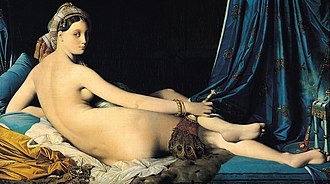Odalisque





[[File:Roybet_-_L'Odalisque.jpg_-->|Roybet - L'Odalisque -->|thumb]] Odalisque is a term originating from the Turkish word odalık, which refers to a chambermaid or a female attendant in the large households of the Ottoman Empire. Over time, in the Western world, the term has come to be associated more specifically with the concubines or female slaves who inhabited the harems of the Ottoman sultans. The concept of the odalisque has been romanticized and eroticized in European art, literature, and orientalist discourse, often representing an idealized, exotic beauty that is both alluring and submissive.
History and Background[edit]
The odalisque held a specific role within the hierarchical structure of the Ottoman harem, which was a complex institution that served not only as the private living quarters of the sultan and his family but also as a courtly institution. The harem was an integral part of the court, functioning as a separate society where women could hold significant power and influence. Odalisques were often slaves or concubines who had been gifted to the sultan, and their primary role was to serve the higher-ranking women of the harem, such as the Sultan's mother (the Valide Sultan) and his legal wife or wives.
In Western Art[edit]
In the 19th century, the figure of the odalisque became a popular subject in Western art, particularly within the movement known as Orientalism. Orientalist painters, influenced by their own imaginations and the exotic allure of the East, depicted odalisques as symbols of opulence and sensuality. These artistic representations were often far removed from the reality of the lives of women in the Ottoman Empire, instead serving as a canvas for Western fantasies about the East.
Famous examples of odalisque paintings include Jean-Auguste-Dominique Ingres's "La Grande Odalisque" and Eugène Delacroix's "Women of Algiers in their Apartment". These works, characterized by their lavish detail and sensual portrayal of their subjects, played a significant role in shaping Western perceptions of Eastern women and the mysterious world of the harem.
Cultural Impact[edit]
The fascination with odalisques in Western art and literature has contributed to enduring stereotypes about Eastern women as passive and sexually available. These representations have been criticized for their orientalist perspective, which views Eastern cultures through a lens of Western superiority and exoticism. The romanticized image of the odalisque has also influenced fashion, photography, and popular culture, where the allure of the exotic continues to be a pervasive theme.
Contemporary Relevance[edit]
In recent years, there has been a growing interest in re-examining and challenging the historical and cultural narratives surrounding odalisques. Scholars and artists alike are exploring the realities of the lives of women in the Ottoman harem, seeking to separate myth from fact and to give voice to the women who have long been silenced by orientalist fantasies. This includes a critical look at the role of odalisques within the Ottoman society and an acknowledgment of their agency, or lack thereof, within the confines of the harem.
See Also[edit]
Ad. Transform your life with W8MD's Budget GLP-1 injections from $75


W8MD offers a medical weight loss program to lose weight in Philadelphia. Our physician-supervised medical weight loss provides:
- Weight loss injections in NYC (generic and brand names):
- Zepbound / Mounjaro, Wegovy / Ozempic, Saxenda
- Most insurances accepted or discounted self-pay rates. We will obtain insurance prior authorizations if needed.
- Generic GLP1 weight loss injections from $75 for the starting dose.
- Also offer prescription weight loss medications including Phentermine, Qsymia, Diethylpropion, Contrave etc.
NYC weight loss doctor appointmentsNYC weight loss doctor appointments
Start your NYC weight loss journey today at our NYC medical weight loss and Philadelphia medical weight loss clinics.
- Call 718-946-5500 to lose weight in NYC or for medical weight loss in Philadelphia 215-676-2334.
- Tags:NYC medical weight loss, Philadelphia lose weight Zepbound NYC, Budget GLP1 weight loss injections, Wegovy Philadelphia, Wegovy NYC, Philadelphia medical weight loss, Brookly weight loss and Wegovy NYC
|
WikiMD's Wellness Encyclopedia |
| Let Food Be Thy Medicine Medicine Thy Food - Hippocrates |
Medical Disclaimer: WikiMD is not a substitute for professional medical advice. The information on WikiMD is provided as an information resource only, may be incorrect, outdated or misleading, and is not to be used or relied on for any diagnostic or treatment purposes. Please consult your health care provider before making any healthcare decisions or for guidance about a specific medical condition. WikiMD expressly disclaims responsibility, and shall have no liability, for any damages, loss, injury, or liability whatsoever suffered as a result of your reliance on the information contained in this site. By visiting this site you agree to the foregoing terms and conditions, which may from time to time be changed or supplemented by WikiMD. If you do not agree to the foregoing terms and conditions, you should not enter or use this site. See full disclaimer.
Credits:Most images are courtesy of Wikimedia commons, and templates, categories Wikipedia, licensed under CC BY SA or similar.
Translate this page: - East Asian
中文,
日本,
한국어,
South Asian
हिन्दी,
தமிழ்,
తెలుగు,
Urdu,
ಕನ್ನಡ,
Southeast Asian
Indonesian,
Vietnamese,
Thai,
မြန်မာဘာသာ,
বাংলা
European
español,
Deutsch,
français,
Greek,
português do Brasil,
polski,
română,
русский,
Nederlands,
norsk,
svenska,
suomi,
Italian
Middle Eastern & African
عربى,
Turkish,
Persian,
Hebrew,
Afrikaans,
isiZulu,
Kiswahili,
Other
Bulgarian,
Hungarian,
Czech,
Swedish,
മലയാളം,
मराठी,
ਪੰਜਾਬੀ,
ગુજરાતી,
Portuguese,
Ukrainian
